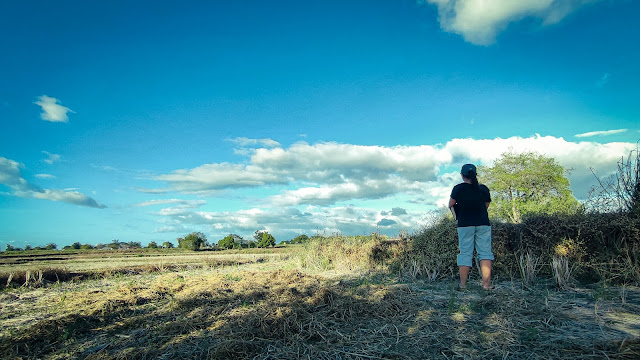The Exciting Life of Stewardship
When it comes to the subject of money, in the church, everyone is divided and has their own take about it. Discussing it makes everyone unconsciously put their hands suddenly on their wallets with caution, "I can listen to the pastor talk about money but I hope he only refers to other people's money, not mine". Filipinos have this warped selfish mentality that relatives who manage to go to other countries are obligated to send them money or boxes full of things, and they being here, are only entitled to receive. "They are rich, we are poor. So only the rich should give." I cannot remember the last time hearing of any local family sending balikbayan boxes to relatives abroad. The true Christian walk is on a different plane when it comes to earthly possessions. Believers are quick to admit that their time on earth is passing, but then again they cling to wealth as if it means everything, and their lives depended on it.
Personal faith is often tested when it comes to the subject of money. It lays out plainly the very soul of any professing believer. I know of leaders in poor local churches that merely gave a "seen" when a fellow believer asks the church for help - not even a dignified reply to the one asking.
Enterprising men (and women) disguised as pastors on the other hand have dragged the concept of giving to the lower pits of hell, giving it a very foul stench to the church body, and to the world. Tithing under the Old Covenant falls under a specific measure of a tenth of the firstfruits of a man's labor. The New Covenant breaks the shackles of that severely limited measure, and elevates the value and worth of this blessed act of engaging in the labor for the kingdom, by making it a matter of the heart. It is now measured not in the amount one gives, but on how little the giver leaves for himself. Giving not as a matter of obligation, but of cheerfulness. Of love for the One who gave. It does not end after you give, but it continues as you seek many ways to involve yourself in the service of God.
George Mueller sheds a drop of credible wisdom on the matter, that true believers of this age will do well to carefully heed and follow.
Whether we are called as missionaries or another trade or profession, we should carry on our business as stewards of the Lord. The child of God has been bought with the precious blood of the Lord Jesus. All that he possesses, his bodily strength, his mental strength, his ability of every kind, his trade or business, and his property, all belong to God . It is written, You are not your own. For you are bought with a price. ( 1 Corinthians 6.19-20 )
The proceeds of our calling are not our own in the sense of having freedom to spend them on the gratification of our pride for our love of pleasure. We have to stand before our Lord and Master as his stewards to seek his will concerning how he will have us use the proceeds of our calling . In 1 Corinthians 16.2, it is written, "Upon the first day of the week let everyone of you lay by him in store , as God has prospered him." A contribution for the poor saints in Judea was to be made, and the brethren at Corinth were exhorted to give every Lord's day according to the measure of success which the Lord has blessed them during the week. Now, shouldn't the saints today also act according to this word? It is altogether in accordance with our pilgrim character to see how much we can afford to give to the poor or to the work of God every week.
We should also keep in mind the scriptural principle, "He which sows sparingly shall reap also sparingly; and he that sows bountifully shall reap also bountifully." (2 Corinthians 9.6). We are abundantly blessed in Jesus, and we need no stimulus to do good works. The forgiveness of our sins, having been made forever the children of God, having before us the Father's house as our home, these blessings should constrain us to serve God in love and gratitude all the days of our lives.
The verse is true, both in this life and in the life to come. if we have been sparingly using or property for him, little treasure will be laid out in heaven. But if the love of Christ constrains a brother to sow bountifully, he will, even in this life, reap bountifully, both in blessings for his soul and in temporal things. "There is that scatters and yet increases, and there is that holds more than is necessary, but still ends in poverty. The liberal soul shall be made fat: and he that waters shall also be watered himself. " (Proverbs 11.24-25).
"Give and it shall be given unto you; good measure, pressed down, and shaken together, and running over, shall men give into your bosom. For with the same measure that you use outside will be used to measure you as well. " (Luke 6.38). This evidently refers to this life and temporal things.
Let us walk as stewards and not act as owners, keeping for ourselves the means with which the Lord has entrusted us. He has not blessed us that we may gratify our own carnal mind but for the sake of using our money in His service and to His praise.
A brother with small earnings may ask, "Should I also give? My earnings are already so small that my family can barely make ends meet."
My reply is, "Have you ever considered that the very reason your earnings remain so small may be because you spend everything on yourself? If God gave you more, you would only use it to increase your own comfort instead of looking to see who is sick or who has no work at all that you might help them."
A brother whose earnings are small maybe greatly tempted to refuse the responsibility of assisting the needy and sick saints or helping the work of God. He thinks it should be the work of a few rich believers and the fellowship. Thus he robs his own soul!
How much should you give of your income? God lays down no rule concerning this point. We should give cheerfully and not because it is required. But even if Jacob, with the first dawning of spiritual light promised to God, a tenth of all, how much should we believers in the Lord Jesus do for Him? (See Genesis 28.22). If the love of Christ causes us to give, we will have this verse fulfilled in our experience. The Lord will abundantly repay as, and in the end we will find that we are not losers even in temporal things.
But the moment someone begins to give for the sake of receiving more back from the Lord, or he stops sowing bountifully in order to increase his own possessions, the river of God's bounty will no longer continue to flow.
The child of God must be willing to be a channel through which God's abundant blessings flow. This channel is narrow and shallow at first, yet some of the waters of God's bounty can pass through. If we cheerfully yield ourselves to this purpose, the channel becomes wider and deeper, allowing more of the bounty of God to pass through. We cannot limit the extent to which God may use us as instruments in communicating blessing if we are willing to yield ourselves to Him and are careful to give him all the glory.
The Autobiography of George Müller
Chapter 20. pp 193-196

Picture a person with his hands closed tightly on all his temporal earthly possessions. He thinks the tighter he holds on to it, the better chance nothing will slip out. True - nothing may slip out, but no blessing can come in either. It is no surprise to find plenty of families who despite eating three meals a day still think they are poor. They are not poor. They are selfish.
.. the upright man gives freely, keeping nothing back.
Proverbs 21.26
I know poor families who eat less and yet are beautiful souls. They give without sparing, more readily than those who profess religion do. Giving is a godly practice (John 3.16a). So should it be as normal as breathing to all who profess to follow Christ to involve themselves, not exclusively with brethren, but with everyone in need.
Then do not be full of care, saying, What will we have for food or drink? or, With what may we be clothed? Because only those who have no God search for these things: your Father in heaven knows that you have need of all these things:
But let your first priority be for His kingdom and His righteousness; and all these other things will be given to you in addition.
Have no care for tomorrow: tomorrow will take care of itself. Take the trouble of the day as it comes.
Matthew 6.31-34


Comments
Post a Comment